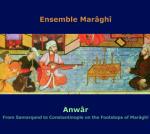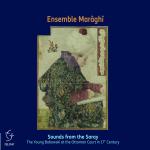

ENSEMBLE MARAGHI
SOUNDS FROM THE SARAY (Young Bobowski at The Ottoman Court)
Fy 8278
885016827823
Felmay Records
Italia
SOUNDS FROM THE SARAY (Young Bobowski at The Ottoman Court)
Fy 8278
World Music
885016827823
Felmay Records
Italia
When he was serving as a music pageboy at the Ottoman court, the Seray, in the second half of 17th century, the young Wojchiech Bobowski (1610? – ca. 1675) transcribed in Western notation the compositions he was learning. Thanks to the accurate interpretation of the Ensemble Marâghî,the music can fly away from a dusty manuscript, never performed before, arriving to our days light and gentle as a morning breeze.
Wojchiech Bobowski (1610? – ca. 1675) alias Albertus BoboviusLeopolitanus alias ‘Ali Ufukî Beyalias ‘Ali Beg el-santurî cymbalista was a multi-faceted author born in Bobowa, not far from the bigger and better known city of L’viv/Lwów (Leopolis), which in his day were both part of the vast Ottoman empire. According to his scarce biographical news, in his youth he was allegedly taken prisoner by Tatar marauds and sold at the slave market in Constantinople, the capital of the empire.Here he was ‘purchased’ by the Ottoman court and took at the Palace (seray) where he served for some years as a pageboy (içoğlan) ‘with the office of music’, as he wrote later, probably as a player of the hammered zither santûr.Having left the seray, he then made a brilliant career as a writer and official translator (dragoman, from the Ottoman tercuman) rather than as a musician: in this sense his considerable knowledge of languages (Latin, Arabic, Polish, French, German, Greek, Hebrew, Italian and Ottoman-Turkish) made him a cultural bridge between European capitals and Constantinople, as well as between the Ottoman court and the many foreign embassies in the city.
After such a career, towards the end of his life he entrusted ambassadors with the only two copies of his precious musical notebooks composed in his youth in different inks and languages. The two small books reached safely their destination and are still preserved today in the BibliothèqueNationale in Paris (F BnFTurc 292), our source for this recording, and in the British Library in London (GB Lbl Sloane 3114) under the title of mecmû‘a-isaz ü söz (‘Miscellaneous Collection of instrumental and Vocal Pieces’). The two manuscripts differ slightly from each other and at this point, after many words, we can point out that we recorded the unica, i.e. the compositions that we find only in the Paris manuscript and that are absent from the London one.
Thanks to the accurate interpretation of the Ensemble Marâghî,the music fly away from a dusty manuscript, never performed before, and comes to us vivid and intense.

tefano Albarello - qanun, tanbur, setar, curasaz,
Giovanni De Zorzi, ney,
Fabio Tricomi. daf, zillidef, bendir, zarb or Tobak, rympani, Kudum, cymbalszil

Our Playlist
Our olaylist on Spotify, dedicated to P
re Minimalism, Minimalism and Post Minimalism.
© 2025 Felmay Srl - P.I. 06974300011 | Powered by: Riccardo Marino
























